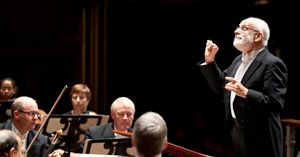by Nicholas Jones

Such is the case for three Handel works performed by the Cleveland Orchestra Thursday. All of them were written for British royal occasions, but you don’t need to be a Brit to appreciate them. Under the guidance of baroque specialist Ton Koopman, the orchestra brought out both the radiance and depth of Handel’s music.
The Water Music must have sounded exciting when played from a barge on the Thames as George I progressed from Whitehall to Chelsea and back again. But I doubt if the music on the waters had the precision and rhythmic energy that it had here in Severance Hall. With clear, straight tone punctuated by short, sharp trills, the familiar tunes sparkled. Even the famous air, used for many a wedding procession, sounded entirely new, its gestures redefined with a light and airy touch.
The reduced string section, clustered around the harpsichord from which Mr. Koopman conducted, played with ensemble and vigor, even when Handel — as often — dealt them complicated, rapid-fire passagework. And if the wind players on the Thames in 1717 played with anything like the mastery of Cleveland’s sections in 2013, they deserved royal pensions. In the Water Music, the oboists were principal Frank Rosenwein, supported by Mary Lynch; the bassoonist was Barrick Stees; and the hornists were Richard King and Jesse McCormick.
Trumpets, timpani, and the 50-person Cleveland Orchestra Chamber Chorus joined the orchestra for the rest of the concert. Zadok the Priest, the first of Handel’s four anthems written for the coronation of George II, has been performed at every British coronation since 1727. The short piece is masterfully constructed to bring us from mystery to patriotic fervor. The acoustics of Severance allowed for a faster tempo than would have been possible in reverberant Westminster Abbey, without sacrificing a sense of spaciousness and grandeur.
The big work of the second half was the Dettingen Te Deum of 1743, so named because it was written on order to celebrate a British victory against the French at Dettingen in Germany. Incidentally, the battle was the last in which a reigning monarch of Britain (Handel’s royal patron George II) personally led his troops in battle.
Using the Book of Common Prayer (the prescribed order of service for Anglican churches), Handel wrote a magnificent piece in multiple sections, for chorus and three soloists. Not surprisingly, there is a fair amount of self-congratulation for God’s having favored the winning side. The patriotic tones, mostly led by the drums and trumpets, made for some exciting music, especially with the vibrant energies of timpanist Paul Yancich and a magnificent trumpet section of principal Michael Sachs, supported by Jack Sutte and Michael Miller.
The basic premise of the liturgical text of Te Deum is that the entire world praises the Lord. The chorus, beautifully prepared and more than usually responsive to the nuances of the conductor, performed that universal praise in full and varied musical inventiveness.
Handel’s astonishing commitment to that musical variety and inventiveness takes the piece well beyond mere jingoism. Innovate chords arrest our attention (including an especially scrumptious one illustrating God’s “infinite majesty”). In a particularly un-gloating tone, an unaccompanied choir petitions God for mercy: “We therefore pray thee, help thy servants.” The entire piece ends on a note of quiet hope: “O Lord, in thee have I trusted; let me never be confounded.” It must have been a sobering reminder that no merely military victory lasts.
Counter-tenor Jay Carter sang with clarity but lacked the vocal presence that was needed to allow his relatively brief solos to stand out. Tenor Steven Soph handled a rather brief ensemble section admirably. The bulk of the soloist work — admittedly not much compared, say, to Messiah — falls to the bass soloist, here the German bass-baritone Klaus Mertens. On Thursday night, Mr. Mertens’ performance seemed uncertain and his mid-range was on the edge of stridency.
With these concerts, Mr. Koopman ends his three years as artist-in-residence with the orchestra. With hard work and infectious enthusiasm, he has infused baroque style into the orchestra, at least as far as possible on modern instruments and in a hall the size of Severance. With his departure, we hope the orchestra will continue to play early music with the confidence and insight that they showed in this concert. But I urge the orchestra to continue to bring in guest conductors of Mr. Koopman’s stature and knowledge in baroque music. This very successful experiment should not be allowed to dwindle away.
Photo by Roger Mastroianni.
Nicholas Jones is Professor of English at Oberlin College and a keen amateur musician.
Published on ClevelandClassical.com May 13, 2013
Click here for a printable version of this article.



